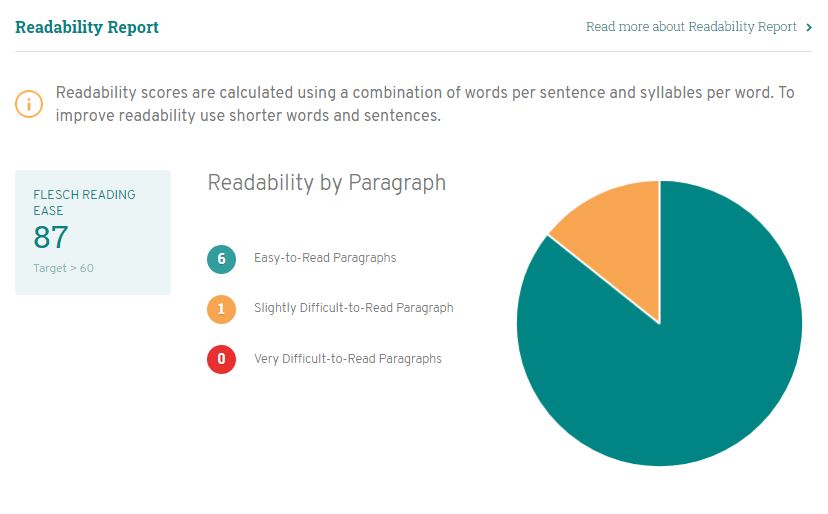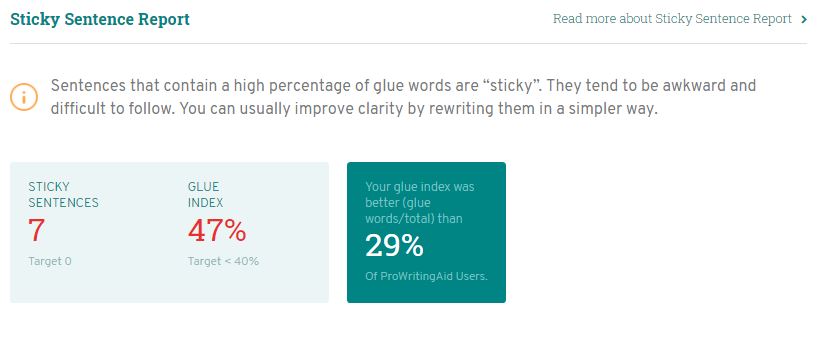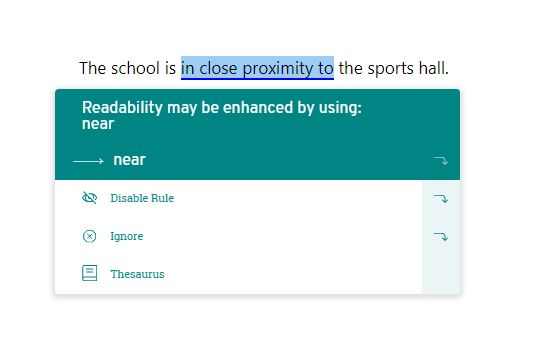
Whether you're writing an academic report, a cover letter, or your next novel, readability matters. It might seem counter-intuitive, but one of the best ways to prove yourself as a talented author is to make your work as simple as possible.
Fancy words and long sentences might make you feel advanced, but they'll make your work more challenging for your reader to engage with and understand. Rather than aiming for the most complex sentences possible, you should aim for easy readability.
In this article, we explain how to use several key ProWritingAid reports to make your work clear and effective. Let's dive in.
Aim for easy readability
Writing is not about showing off all the fancy words you know; it's about making your work accessible and enjoyable. Readability scores tell you how easy it is for someone to read your work.
The ProWritingAid Readability Report looks at factors like sentence length, syllable density, and word familiarity to tell you what groups of readers will be able to access your text.

The higher the readability score, the more advanced your text is and the harder it is to comprehend. If one of your documents earns a high readability score, it can mean a number of different things:
- You’re using too much jargon. When you use jargon, you’re using specialized, industry-specific terms that are difficult for your reader to understand.
- Your sentences are too long. Long, winding sentences can make your writing hard to follow. Write the way you speak: simply and clearly.
- Your vocabulary is too advanced. While complicated words might earn you tons of points in Scrabble, they’re typically a barrier of entry for your readers. You don’t need to make your vocabulary super complicated to prove that you’re an effective writer.
Use the Readability Report to highlight any sentences or paragraphs that you should rewrite in a more accessible way.
Make passive constructions active
Aside from being your high school English teacher's worst nightmare, passive sentence constructions get in the way of readers understanding your work. In a passive voice sentence, you've written the object of your sentence first and then put the subject of your sentence at the end.
Here's an example:
- The cat's bowl was filled by Marie.
Marie is the subject of the sentence: she's the one filling the bowl. But we don't find out about her until the very end of the sentence. This example sentence is fairly simple, but in more complex sentences, hiding the subject by using passive voice can be troublesome:
- The Battle of Waterloo occurred on Sunday, June 18, and was lost by Napoleon, leading to centuries of British domination.
The above sentence is confusing. As a reader, you can't easily tell who won and lost the battle, making the sentence's meaning obscured. Here's a rewrite using active voice:
- Napoleon lost the Battle of Waterloo on Sunday, June 18, leading to centuries of British domination.
Much clearer and easier to understand! While passive voice isn't technically incorrect (and may in some cases be necessary), you should know where it occurs in your work to decide whether to rewrite for more clarity and drive. ProWritingAid's Style Report identifies passive voice in your writing so you can make it active where appropriate.
Avoid sticky sentences

Sticky sentences are another sign of poor readability. They are sentences that contain too many "glue words". Glue words are those words that hold a sentence together but have little meaning in themselves like in, on, of, this, just, etc.
It's a matter of percentages. Every sentence has (and needs) glue words. But when you get too many in a sentence, it's a sign that your sentence isn't as clear and concise as it could be. In practical terms, it's difficult to read because it meanders on too much.
Aim to have an average of less than 40% glue words throughout your text. Some sentences might go over that mark, but it should only happen rarely and only for a good reason.
Let's look at a sticky sentence fix:
- Sentence 1: If you are going to take a vitamin, there are a lot that can be useful but I would like to recommend taking vitamin C because it helps boost your whole immune system. (53% glue index)
This sentence has words that aren’t necessary. It's long and convoluted, making it hard to understand. The reader can't easily get to the main point: that Vitamin C helps boost your whole immune system. Here’s how to rewrite it with a lower percentage of glue words:
- Sentence 2: Many vitamins are useful, but I recommend vitamin C because it boosts your immune system. (27% glue index)
This second sentence is much clearer. The reader can easily decipher the author's main point.
Remove unnecessary words

When it comes to writing, less is more. Make every word count. If it's not essential, cut it.
Too often when writers are trying to sound authoritative, they choose the wordy ways of saying something simple. Why write has the ability to when you can write can? You’re just using more words to say the same thing, which actually makes your writing much less clear.
Some other examples include:
- at this point in time ➡ now
- due to the fact that ➡ because
- in order to ➡ to
- in the event that ➡ if
- prior to the start of ➡ before
- has been found to be ➡ is
- a sufficient amount of ➡ enough
- at such time as ➡ when
- for the reason that ➡ because
- in close proximity to ➡ near
- it is our opinion that ➡ we think
- serves the function of being ➡ is
- in the near future ➡ soon
ProWritingAid's Writing Style Report and Diction Report will both help you find simpler ways of saying the same thing.
No matter what you're writing, readability is key
Effective communication is key. No matter your writing goal, the clearer your writing is, the better you will get your ideas across to your reader.
We designed ProWritingAid's writing reports to help you identify areas in your text that are difficult to read. By using ProWritingAid, you can make your writing enjoyable for your readers.



